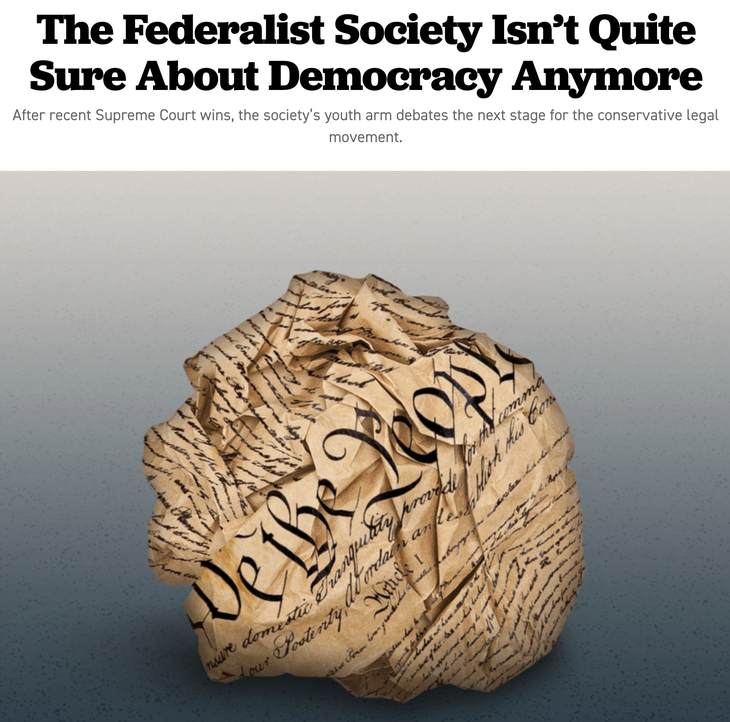After I saw this excerpt from a Politico profile of the latest Federalist Society conference held in Austin, TX, I just had to read the piece.
I did, and a dumber take would be difficult to find.

Ironically the author, a contributing editor at the magazine named Ian Ward, probably DID think that the statement is a tongue-in-cheek slogan, not a simple statement of fact.
The state of journalism is such that an editor at one of the premier publications covering the federal government apparently doesn’t know that the United States is, in fact, a Republic. A representative democracy that is built upon federal principles where sovereignty is divided among various levels of government with different roles and responsibilities. Some powers are reserved to the various levels, and with a national legislative branch where both the people as a whole and the states themselves as separate sovereign entities have representation.
There’s a handy guide to how this works, and it is called the Constitution of the United States. There is also an instruction manual called the Federalist Papers, after which the Federalist Society is named. I expect that everybody in that room he was in had read the Federalist Papers, except him of course.
Some of the details can lead to complex questions, but the basics are simple and even used to be taught in schools. That, apparently, no longer happens, and even political reporters at prestigious media outlets are unfamiliar with the concepts involved.
Tongue-in-cheek. That was the tone of the whole article, and I can understand why. A political reporter unfamiliar with the most basic principles of our government or the foundational law of the political system he covers would of course be bemused when surrounded by normal, smart, and thoughtful people debating the fineries of the law.
To him, I assume, it is weird for anybody to actually care about procedural matters. Politics is about getting what you want, and the best way to get what you want is to get power in any way possible. Fine terms like “democracy” are useful rhetorical tools, but only because many people haven’t yet awoken to the fact that we are governed by sophists who will save anything and often do anything in order to get the power they crave.

The irony of this piece is breathtaking. The opening image says it all, although not in the way that Politico wants you to believe. The people at that conference are still debating about how best to understand the constitution and apply the law in a way that preserves the founding principles of our country.
The context of that quote I started with is revelatory. Ward seemed to be taken aback by facts that anybody who took a civics class prior to the 90s would understand:
What democracy does not mean, Lowenstein argued, was “plebiscitary democracy,” or simple rule by democratic majorities. Citing the Federalist Papers — the namesake of the Federalist Society — Lowenstein suggested that governance based on simple mathematical majorities would enable “tyrannical domination of the minority by the majority.”
“The assumption that only plebiscitary forms [of government] are truly democratic is fallacious, and should be openly and directly contested by those supporting non-plebiscitary positions,” he added.
Behind me, somebody whispered, “We’re a republic, not a democracy” — a tongue-in-cheek slogan that some conservatives have adopted as a way to slyly signal their approval of minority rule.
Ironically, the system is designed this way not to create minority rule, but to prevent majority tyranny. Our system of government has the responsibility to preserve the rights and freedoms that belong to all human beings. It is imperfect at that, of course, and the Left reminds us of this fact every moment of the day. On the other hand, plebiscitary democracies are also imperfect, and tend toward, not away from the violation of basic rights.
And the reason is simple: if majority rule is the norm, majorities can just impose their will whenever they want. Amplifying minority power is there for a reason, and that reason is to avoid empowering the passions of inflamed majorities.
Again, this is civics 101 stuff. Which, apparently, even high-powered political reporters don’t know anymore.
Ward appears to be a millennial, which explains both his ignorance and the attitude that drips from his article. He seems perplexed by the people as much as the arguments at the Federalist Society conference. Consider this description and make of it what you will. I found it striking.
At a reception the night before, gaggles of fresh-faced law students had sipped frozen margaritas and piled their plates with barbecue from a nearby buffet. Many of the students accessorized their suits and cocktail dresses with cowboy boots and Stetsons. Peals of laughter rippled around the room. It was the type of event where you’d expect everyone to slink back to the hotel afterward to get drunk and hook up, except that most of the students I talked to were either married or engaged. A few of the young attendees had brought their infant children along with them.
Ward seems genuinely shocked that normal smart people are acting like normal smart people.
They are married!
They have children!
They don’t hook up!
They are younger than he, but are living lives like responsible adults!
What gives? Clearly, they are psychopaths, discussing the law and acting like productive citizens. None of this should surprise you. Ian himself is a hip New Yorker who is into funky stories.

His bio on his website reads: Ian Ward is a journalist based in Brooklyn, New York. His writing regularly appears in POLITICO Magazine, where he is a contributing editor. A native of Washington, D.C., he writes about the offbeat and eccentric elements of American political life.
The Federalist Society apparently is offbeat and eccentric or something, and to a New York millennial it probably genuinely seems so.
The entire piece is well worth the read, not because you learn anything about the Federalist Society, but because you learn a lot about how young reporters think and what their editors deem worthy of publishing.
Were I still a political science instructor teaching US government 101 I would feel like a failure if this were turned in by a student. The ignorance on display alone is discouraging, and the attitude of the author makes you weep for our future. Being surprised that young people aren’t all sybarite barbarians tells you everything you need to know about the hip, urban millennial. They literally don’t know people who are not fundamentally broken morally.
I assume Ian is both smart and a pleasant person.
What he is not is well-educated, or the product of a healthy, self-perpetuating society.








Join the conversation as a VIP Member